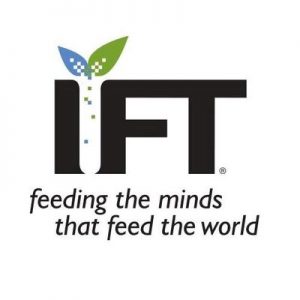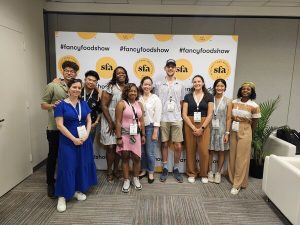IFT Names Winners of Student Product, Research Competitions
 The Institute of Food Technologists, a nonprofit scientific organization committed to advancing the science of food and its application across the global food system, is proud to announce the winners of the IFT Student Association product development and research competitions. The winners were revealed at the IFTSA Closing Ceremony at the recently completed IFT FIRST: Annual Event and Expo, the popular food science, technology, and innovation event that was held July 14-17 in Chicago.
The Institute of Food Technologists, a nonprofit scientific organization committed to advancing the science of food and its application across the global food system, is proud to announce the winners of the IFT Student Association product development and research competitions. The winners were revealed at the IFTSA Closing Ceremony at the recently completed IFT FIRST: Annual Event and Expo, the popular food science, technology, and innovation event that was held July 14-17 in Chicago.
“Some of my favorite IFT FIRST moments every year are the student competitions and research IFTshowcases that allow our next generation of food leaders to share their passion and brilliance with the global science of food community,” said IFT CEO Christie Tarantino-Dean. “While the IFTSA Closing Ceremony recognizes the winners of these competitions, it truly is a celebration of our growing student community and their commitment to driving impact through innovation.”
A summary of Achievement Award and Competition Winners is below:
American Egg Board Eggcelerator Lab Product Development Competition
New this year, the American Egg Board celebrated the winners of its Inaugural Eggcelerator Lab Product Development Competition, which challenged students to push the boundaries of snack-making to develop a novel snack product capable of making a good source of protein claim with the majority of protein sourced from egg ingredients. The first-place recipients were Sanket Prakash Vanare and Mackenzie Bui from the University of Georgia, Athens for Eggspresso, a dried powder that transforms into a high protein iced coffee beverage when added to ice water. The duo won $8,000 as part of the grand prize recognition.
IFTSA & Mars Product Development Competition
Through a 34-year sponsorship with Mars Wrigley, school teams develop a new food idea and carry the concept through marketing and production. The winner of the IFTSA and Mars Product Development Competition and recipient of the $3,000 first place prize was the team from Chapman University for SOL – Spice of Life, a vanilla chai-flavored, shelf-stable ultra-high temperature, dairy-based wellness beverage. It is a pioneering ultra-filtered milk-based wellness shot offering unparalleled versatility in consumption methods while accommodating lactose-intolerant individuals. The product also contains cognitive functional ingredients including L-theanine to provide alertness and mental clarity beyond the benefits of caffeine.
Developing Solutions for Developing Countries Product Development Competition
The IFTSA Developing Solutions for Developing Countries Product Development Competition promotes the application of food science and technology and the development of new products and processes that are targeted at improving the quality of life for people in developing countries. This year’s winner and taking home the $3,000 top prize was the team from the University of Costa Rica for HopEnergy, an instant powdered drink designed for migrants passing through Costa Rica made from panela, milk, grains, and seeds. It is high in protein and calcium, and is a source of iron, vitamin A, and fiber. The Developing Solutions for Developing Countries competition is sponsored by Feeding Tomorrow Fund of IFT, which encourages, promotes, and rewards the excellence of students pursuing careers in the science of food through various efforts including a variety of academic tuition scholarships.
Smart Snacks for Kids Product Development Competition
The IFTSA Smart Snacks for Kids Competition challenges students to develop a fun and nutritious food or beverage product for kids and/or teens that abide by the USDA “Guide to Smart Snacks in School” recommendations, which aims to offer kids foods and beverages with more whole grains, fruits and vegetables, leaner protein, and low-fat dairy while limiting foods with too much sugar, fat, and salt. The winner of the $3,000 top prize was the team from McGill University for Magic Mud Pot, a delightful, health-conscious, and engaging alternative to traditional chocolate pudding. Designed to captivate children and satisfy the requirements of parents and schools alike, these gluten-free and nut-free treats offer a decadent cup of chocolate black bean pudding crowned with a lid split into two compartments – one containing vegetable-shaped gummies and the other containing chocolate quinoa crumble. Last year, McGill University also won this product development competition for Hungry Monsters.
Graduate Research Video Competition
A long-time sponsor of the event, Campden BRI offered graduate students the opportunity of a lifetime. The winner of the Graduate Research Video Competition – which featured graduate students showcasing their original research in a fun, creative, three-minute video – is invited to visit Campden BRI in the United Kingdom. Ivannova Lituma from Louisiana State University won for her research on “Effect of UV-C Light Treatment Against Listeria Monocytogenes on Hydroponically Grown Lettuce and its Effect on Quality.” As winner, Lituma will join last year’s winner, Oregon State’s Jenna Fryer, on a 10-day industry visit in the United Kingdom where she will have the opportunity to experience each of the major divisions of Campden BRI (science, technology, brewing, and knowledge management) and gain insight into the UK/EU perspective.
Undergraduate Research Competition
Sponsored by Phi Tau Sigma, the Undergraduate Research Competition was designed to showcase outstanding research at the undergraduate level. Stefhanie Loaiza-Sanchez from the University of Costa Rica was recognized for her research on “Prevalence and inactivation of Salmonella in microwaveable frozen ready-to-eat (RTE) and not-ready-to-eat (NRTE) chicken products.”
College Bowl
Since 1985, the IFTSA College Bowl Competition has tested the knowledge of student teams from across the United States in the following areas: food science and technology, the history of foods and food processing, food law, and general IFT/food-related trivia. The College Bowl is designed to facilitate interaction among students from different universities and provides a forum for students to engage in friendly competition. Teams from universities and institutions competed in regional competitions within eight geographical areas. The winning regional teams then competed live in a final competition at IFT FIRST. Earning the prestigious title of College Bowl champion this year was the University of Wisconsin-Madison, which completed its undefeated run with a victory over California State Polytechnic University, Pomona in the finals.
Excellence in Leadership: Graduate and Undergraduate
The Excellence in Leadership Award recognizes two student members of IFT, one undergraduate and one graduate student, who have demonstrated exemplary leadership in their execution of student activities that furthers the mission of IFT. The graduate student winner was Cyprian Syeunda from Texas A&M University, and the undergraduate winner was Sebastián Andrés Garzón García from Universidad San Francisco de Quito (USFQ). USFQ is one of three new IFTSA Chapters this year.
Chapter of the Year
The Chapter of the Year Award honors one IFTSA Chapter that exemplifies IFTSA’s Vision and Mission and providing value to its members locally. This award also honors outstanding chapters in each of the following strategic promises: Prepare for the Future and Celebrate the Community. There are more than 60 IFTSA Chapters around the world. The winning Chapter this year was Iowa State University.
IFTSA is a student-governed community of IFT members. The mission-driven organization executes programming and competitions throughout the year, supports student members and chapters, and aims to develop the leaders in the future of the science of food.
“IFTSA helps students become more involved with the broad science of food community. Not only can students connect with other students who will one day become their peers, but they can also connect with current and past professionals who can offer valuable mentorship and guidance, as well,” added IFTSA President Luuvan Hoang. “Together, we can end world hunger and feed the world for future generations.”
To learn more about becoming a student member and taking advantage of networking, education, and advocacy opportunities year-round, email membershipinfo@ift.org.
About Institute of Food Technologists Student Association
The Institute of Food Technologists Student Association (IFTSA) is a student-governed community of more than 2,000 IFT members spanning 62 Chapters in 60 countries. IFTSA’s vision of a global community of inspired and informed students who are prepared for a future in food drives its mission to enrich the academic experience and empower students to thrive individually and together. To prepare the future and celebrate the community, IFTSA provides opportunities beyond the classroom and lab, grows student networks to facilitate meaningful and lasting connections, as well as includes and promotes diverse perspectives and backgrounds to foster a culture of belonging. For more information, visit ift.org/community/students.
About Institute of Food Technologists
The Institute of Food Technologists (IFT) is a global organization of over 11,000 individual members from more than 90 countries committed to advancing the science of food. Since 1939, IFT has brought together the brightest minds in food science, technology and related professions from academia, government, and industry to solve the world’s greatest food challenges. IFT works to ensure that its members have the resources they need to learn, grow, and innovate to advance the science of food as the population and the world evolve. IFT believes that science and innovation is essential to ensuring a global food supply that is sustainable, safe, nutritious, and accessible to all. For more information, please visit ift.org.
For more news of interest to the specialty food industry, subscribe to Gourmet News.
Strike Force Discusses Grocery Prices, Price Gouging in Industries

 The Federal Trade Commission and the Department of Justice virtually co-hosted the first public meeting of the Strike Force on Unfair and Illegal Pricing to discuss Strike Force enforcement actions taken to lower prices for Americans.
The Federal Trade Commission and the Department of Justice virtually co-hosted the first public meeting of the Strike Force on Unfair and Illegal Pricing to discuss Strike Force enforcement actions taken to lower prices for Americans.
FTC Chair Lina M. Khan, DOJ Acting Associate Attorney General Benjamin Mizer, Assistant Attorney General Jonathan Kanter, and Principal Deputy Assistant Attorney General Brian Boynton, along with other agencies on the strike force convened to highlight the following enforcement actions:
Khan highlighted the FTC’s recent work to stop corporate lawbreaking that raises prices for Americans, including uncovering evidence of corporate conduct that may raise the price of gas, working to lower the cost of many asthma inhalers to just $35 out-of-pocket, and making it easier for Americans to cancel online subscriptions they don’t want. Chair Khan announced that she will ask the Commission to launch an inquiry into grocery prices in order to probe the tactics that big grocery chains use to hike prices and extract profits from everyday Americans at the checkout counter.
Mizer described DOJ’s efforts to tackle unlawful behavior that affects the prices Americans pay for their groceries, transportation, and health care. Kanter highlighted the historic and concrete actions Antitrust Division staff are undertaking to enforce the law and lower prices in higher education, housing, transportation, food, agriculture, live music, healthcare and other vital industries.
Boynton highlighted the Civil Division’s work to combat fraudulent pricing schemes involving government agencies and financial institutions, as well as schemes designed to defraud consumers through unfair and deceptive marketing or billing practices.
U.S. Department of Agriculture Deputy Secretary Torres Small highlighted the all-of-USDA approach to tackling food and agricultural pricing challenges for farmers and consumers alike, including an ongoing investigative study on retail concentration and market practices as well as landmark efforts to modernize the Packers & Stockyards Act rulebook and build a competition partnership with state attorneys general.
U.S. Department of Health and Human Services Deputy Secretary Andrea Palm spoke on HHS’s work to make health care affordable, transparent, and fair for everyone. Increasing competition and transparency, lowering prescription drug prices, and expanding access to health care are key ways to make sure our health care system is working for all Americans.
Acting U.S. Department of Transportation General Counsel Subash Iyer spoke about DOT’s work to protect airline passengers from unfair practices that can make it more expensive to fly, including by proposing a ban on family seating junk fees and investigating Delta’s refund, reimbursement, and customer service problems during the recent IT meltdown.
U.S. Securities and Exchange Commission Chair Gary Gensler spoke about the SEC’s work to address unfair, deceptive, and anticompetitive business practices. The SEC is the cop on the beat for the securities markets. The agency’s rulemaking projects promote transparency, access, and fair dealing in the markets. And through market oversight, including examining registrants and reviewing tens of thousands of filings each year, the SEC guards against fraud and deceptive practices and promotes competition.
U.S. Federal Communications Commission Chairwoman Jessica Rosenworcel spoke about the FCC’s work to tackle unfair and deceptive pricing tactics in the communications sector, including by implementing new rules that will slash the exorbitant rates that incarcerated people and their families pay to stay connected.
Consumer Financial Protection Bureau Director Rohit Chopra spoke about the CFPB’s work on junk fees, highlighting a report on school lunch fees, and a recently launched inquiry into junk fees in mortgage closing costs. The CFPB continues its work on all aspects of the credit card market, including looking into bait-and-switch rewards tactics, curbing excessive fees, and ensuring competition, all against the backdrop of interest rate margins hitting an all-time high. Additionally, the agency announced further scrutiny on the role of private equity investors in price gouging.
In March 2024, at the sixth meeting of the White House Competition Council, President Biden announced the launch of the Strike Force to strengthen interagency efforts to root out and stop illegal corporate behavior that hikes prices on American families through anti-competitive, unfair, deceptive, or fraudulent business practices.
The Federal Trade Commission works to promote competition, and protect and educate consumers. The FTC will never demand money, make threats, tell you to transfer money, or promise you a prize. You can learn more about how competition benefits consumers or file an antitrust complaint. For the latest news and resources, follow the FTC on social media, subscribe to press releases and read our blog.
For more news of interest to the grocery industry, subscribe to Gourmet News.
Gen Z Students Cover Summer Fancy Food Show Spotting Trends
The Specialty Food Association hosted 10 students from the Drexel Food Lab/Certificate in Food Entrepreneurship and Innovation programs during the 2024 Summer Fancy Food Show, June 23-25 at the Javits Center in New York City. With Gen Z consumers spending around 40 percent of their grocery budgets on specialty items, insights from college-aged food enthusiasts are a hot commodity as the industry looks to maintain its growth into the future.
Following three days of snacking, walking and talking with vendors from 56 countries across the world, the Junior Trendspotters determined five standout trends, listed below, through a Gen Z lens.
Led by Drexel Food Lab Associate Director Chef Rachel Sherman along with Drexel University Professor Jonathan Deutsch and Chef Brooke Olasewere, this year’s Junior Trendspotters team included:
- Felicia Yan
- Belinda Faakye
- Zae’Onah Howell
- Adam Gladstone
- Victoria Sanchez-Galarza
- Alessandra Mora
- Alex Ly
- Gabe Thayer
- Jocelyn Leal
- DeAndra Forde
“We were so honored to be invited to the Fancy Food Show this year. It is a great way for our students to see how broad the food industry is and understand the impact of the work we do at the lab,” said Sherman. “I find it encouraging to see what products and trends jump out to them. Each student found at least one highlight that I missed. With such a big show it can be easy to overlook something, and students have a great eye for finding standouts amongst the excitement. We ran into multiple alums who were showcasing this year, inspiring the next generation of food professionals.”
“The Fancy Food Show is something I always look forward to each year. Visiting the booths is always a great opportunity to connect with individuals in the field as well as to learn about new, upcoming products. I personally love working as a Junior Trendspotter because it allows me to look at the exhibits through a more critical lens and analyze what is a new trend versus what is something that continues to be popular from previous years,” said Sanchez-Galarza, senior, culinary arts and sciences.
“It’s really fascinating and informative to see the overlaps and divergences between top trends identified by SFA’s Junior Trendspotters and those noted by Millennial and Gen X Trendspotters,” said Leana Salama, SVP of marketing and communications at SFA. “Where inescapable trends like global flavors or honey appear in both lists, the Junior Trendspotter’s callout of non-traditional flours speaks to something essential about the Gen Z experience of and interest in specialty foods. Thank you to the Junior Trendspotters team and advisors for providing these invaluable insights and product highlights to the SFA audience.”
The Summer Fancy Food Show Junior Trendspotters identified the following top trends:
-
Beverage boom: Innovation in beverages continues—this year, many were sparkling, cocktail-inspired, or had functional attributes. Brands such as Kombucharista combine multiple elements with non-alcoholic, cocktail flavored, gut-healthy, prepared drinks. Bluestem Botanicals, who use herbs in organic mocktail kits, and Seraphim Beverages, who have pioneered a non-alcoholic wine, display the market is ripe with non-alcoholic offerings. Ceybon comes in with mushroom-infused aperitif and elixir concentrates, which create the perfect backdrop for non-alcoholic, wellness cocktails. Unity rounds out this category with natural energy drinks with adaptogens for extra health benefits. The growing trend is clean labels and additional health benefits without compromising on taste. Finally, the dry beverage market has also expanded. Pinky Up offers boba in a tea bag while Everydaze Reset Kombucha has powdered kombucha in a variety of flavors.
-
Crunchy snacks: If you ever wanted to make a loud announcement when walking into a room, you now have endless edible means to do so. In the snack category, there was great innovation and experimentation that highlighted new methods of producing snacks, ingredients, and flavors. Mr. Mushroom features vacuum-fried vegetables such as mushrooms (shocker), tomatoes, and lotus root. Similarly, freeze dried snacks are being brought to the market by brands like Uptop Treats and Pocas. Brands like Bret’s Chips has expanded the classic potato chip into gourmet flavors like camembert and summer truffle. Everyone is bound to find a new favorite snack!
-
Global flavors: With the summer months here, everyone seems to be going somewhere. Can’t afford a plane ticket but don’t want to miss out on the fun? No worries! Travel the world in less than 80 days with sauces and spices from Watcharee (Thailand), Perfeito (Brazil), HOXY (Korea), and Brundo (Ethiopia). Kasé’s dashi soy sauce, Pink Salt’s Nam Prik Pao, and Auria’s hot chili sambal can brighten up a meal. Prepared foods like Xinca‘s pupusas, Doro’s Cheesy Korean Rice Cakes, and snacks like HBAF‘s impressive flavor library like tteok-bokki almonds or cheeseburger popcorn exhibit how global flavors have popularized across the industry.
-
Flours beyond whole wheat: As gluten-free snack innovation continues, we see a wider variety of featured alternatives. Diggables strays from the traditional with buckwheat puffs. In the same vein, Sorghum Symphony’s puffed snacks include global flavors like churro and curry while Yuca Balls offers a crunchy cassava snack. Ieialel offers dehydrated fermented millet flour while Local village has ready to eat sorghum grain in brine along with their sorghum, teff, and tiger nut flours. For Good granola features buckwheat in their oat free granola. Yolélé has expanded fonio to the American market with chips made from the African grain.
-
Honey everything: Honey is having a moment. From hot honey to honey tea and sauces, you could not walk more than an aisle or two without tasting a honey product. Explorer has a honey chai concentrate, Savannah Bee Company launched a honey hot sauce. Fresh Fizz sweetens their sodas with honey. Casa Folino’s set out a wide array of flavored honey like bergamot, lemon, and balsamic. Bumbleberry farms featured their peach vanilla cream spread. Zen Bear has a selection of honey teas. Honey B has a sparkling honey drink and the list goes on. But of course, purists could always choose one of the many honeys brought by vendors from all over the world.
A full Trendspotter Panel report from the Summer Fancy Food Show can be found online.
The next Fancy Food Shows are the 2025 Winter Fancy Food Show, Jan. 19-21 at the Las Vegas Convention Center, and the 2025 Summer Fancy Food Show, June 29-July 1 at the Javits Center in New York City. Open only to food industry professionals, journalists and influencers, the Fancy Food Shows require registration and qualification. For additional information visit specialtyfood.com.
For more news of interest to the specialty food industry, subscribe to Gourmet News.







